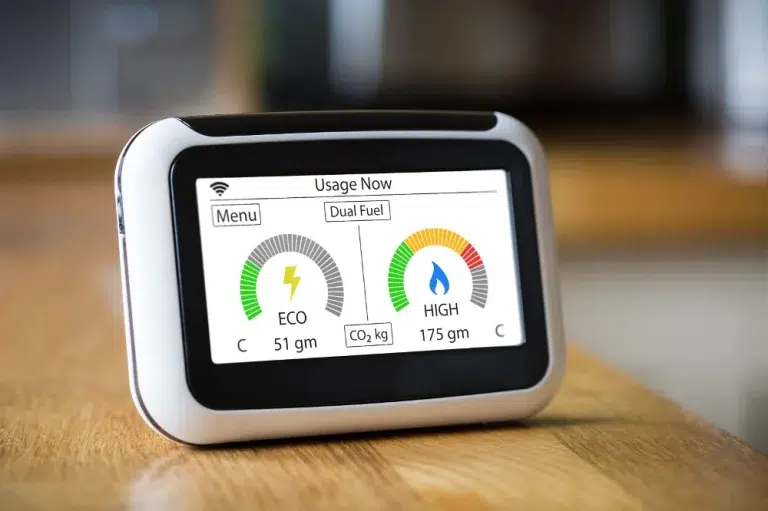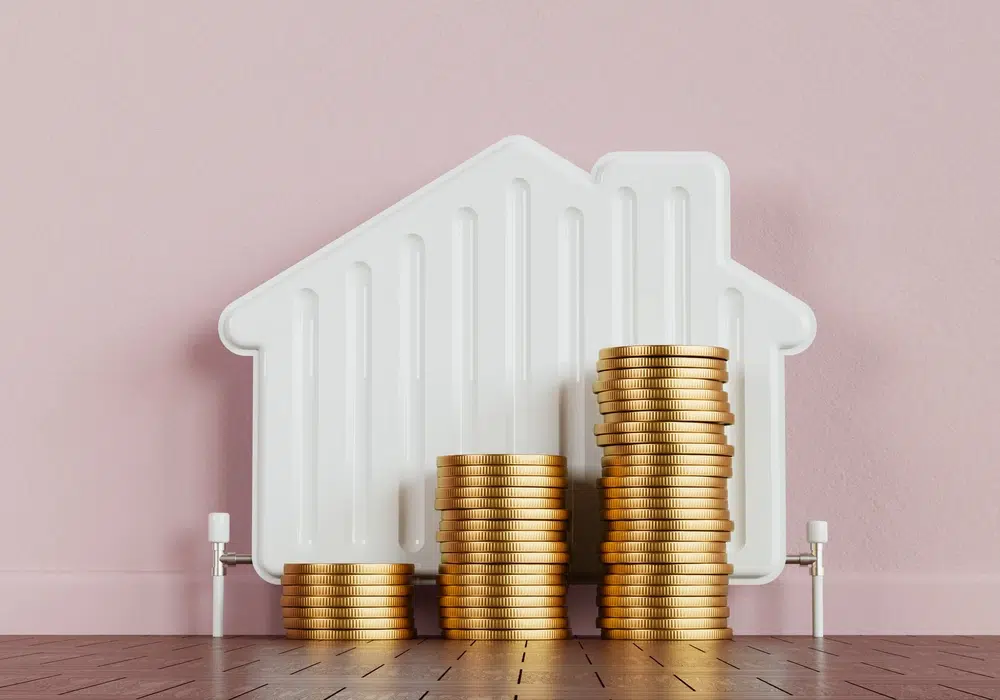Smart meters eliminate the need to take manual meter readings, and they can help you use gas and electricity more consciously. The national smart meter rollout is in full swing, and the UK government’s target was to install smart meters in 100% of homes in England, Scotland, and Wales by 2025. So, if you haven’t been offered an upgrade already, you may be soon. But are smart meters worth it?
According to information from Smart Energy GB, 55% of meters in UK homes and businesses are smart, and all new and replacement meters are now smart by default. But you might still have questions about exactly what a smart meter is, what it means for your energy usage, and whether there are any drawbacks to switching.
Here, we answer the most frequently asked questions and take you through the pros and cons of the latest generation of smart meters being installed in the UK.
- What is a smart meter?
- The advantages of smart meters
- Does a smart meter save money?
- Is it worth getting a smart meter? Disadvantages
- Do smart meters cost more?
- Are smart meters secure?
- Do you have to have a smart meter?
- Final word: Is it better to have a smart meter or not?
What is a smart meter?
A smart meter is a gas or electricity meter that connects to your energy supplier through a secure wireless network. They come with a communication hub, which sends and receives data, and a small screen (known as an in-home display, or IHD) to show how much energy you’re using.
As you go about your day — switching on lights, using the washing machine, running the bath, cooking — your smart meter monitors exactly how much energy you’re using. It sends this information to your provider every 30 minutes and shows you exactly how much gas and electricity you’re using both in kWh and in pounds and pennies, helping you to become more energy efficient.
Smart meters are currently replacing all old gas and electricity meters, including prepayment meters. In new properties, smart meters come standard, and energy companies are obliged to offer a smart meter as a replacement for traditional meters to meet government targets.
But when you’re offered one, you don’t have to say yes, so here’s what to know as you make your decision.
The advantages of smart meters
If you’re still asking whether a smart meter is right for you, think about these positives.
Smart meters eliminate the need to read your own meter
Because smart meters send information to your supplier, you won’t have to take a manual reading and upload the figures, or make sure you’re home for an annual reading.
This isn’t just convenient, it also eliminates a safety concern for customers whose meter is difficult to reach. Instead of getting a chair and a torch and scrambling to read the dials, the task is removed completely from your to-do list.
Smart meters give more accurate bills
With older electricity and gas meters, your bill is based on the reading from the energy company’s representative and any data you upload yourself. This means it’s often based on an estimate of how much you’ll use, rather than your actual energy consumption.
Many people have received an unexpectedly high bill at one point or another, or waited a long time for a refund after paying for energy they didn’t actually use.
With a smart meter, your supplier gets ongoing information about your energy usage, resulting in greater accuracy so you no longer have to rely on poorly estimated bills. And when you know you’re less likely to over or underpay your bill, the rest of your household budgeting becomes easier.
Because the information about your energy usage is always up to date on your smart meter, it’s also less hassle to take a final reading when you move house or switch energy suppliers.
Smart meters help you to use energy more consciously
When you can see your energy use throughout the day, it gives you a clearer idea of how different appliances affect your bill. You can use this information to help you save money and improve your energy efficiency by making more informed decisions.
For example, if you figure out that you spend approximately 80p more on the days you cook dinner in the oven, you might be motivated to choose one-pan recipes or invest in an air fryer.
Does a smart meter save money?
Unlike other changes like switching to LED lightbulbs or insulating your loft, a smart meter won’t automatically save money on your energy bills. But the information the smart meter gives you can help you to lower your usage, so you’ll pay for less.
Some energy providers are also moving towards more affordable tariffs for consumers who opt for a smart meter, which means that upgrading could give you access to a better deal.
Increasingly, a smart meter may also give you access to tariffs where energy costs less at off-peak times (for example, to encourage people to charge electric vehicles overnight). Or where you pay less on a particularly windy or sunny day if your electricity comes from sustainable sources.
Is it worth getting a smart meter? Disadvantages
Conscious energy usage is undoubtedly better for the planet, which is enough to motivate many households to accept a smart meter when they’re offered one. There’s also no doubt that they can also help you lower energy bills. But as the rollout continues, some people are still asking if it’s worth having a smart meter at all.
Here are the possible downsides to be aware of.
Smart meters can malfunction
Smart meters are incredibly secure and reliable, but as with any technology, things can go wrong. Although you won’t have to pay for the initial installation of your smart meter, your supplier might charge you for a repair or a new meter if something goes wrong.
The good news, though, is that the problem behind the reports of smart meters becoming “dumb” has been solved with the new-generation devices. Being dumb refers to meters losing their ability to connect to the network and send information to your supplier.
With the first generation SMETS 1 devices, people who changed energy suppliers tended to struggle to connect their meter to their new provider. Thankfully, the second generation SMETS 2 devices that are now installed as standard can be updated without any issues or inconvenience. (SMETS is an acronym that stands for smart metering equipment technical specifications.)
Smart meters aren’t available everywhere
Smart meters are being rolled out gradually, largely because energy companies have to wait until the mobile network in every region can fully support the latest technology.
Unfortunately, this means you may have to wait longer than you’d like to receive your smart meter, especially if you live in a rural area. But if you’re keen, you can always contact your energy supplier directly to ask for an appointment. If the technology is already up and running in your area, they’ll likely be able to fit you in within a few weeks.

Smart meter installation can be time-consuming
The process of fitting the meter to your energy supply, setting up the IHD, and checking that it’s transmitting the data correctly can take one to two hours per meter (so if you’re switching for both electricity and gas, it could take an entire morning or afternoon). During the installation, the engineer will have to switch off your supply.
This can be a little inconvenient, but once it’s over, you’ll save the time you would have spent reading the meter or waiting at home for the engineer to do an annual reading.
Smart meters can be automatically switched to prepayment plans
Because smart meters can receive information from your supplier as well as send data, your supplier can switch you to a prepaid plan rather than a credit plan if you fall behind on your payments. Previously, this would have needed an engineer to come to your home, but with smart meters, it can now be done remotely.
In some ways, this is a plus. Prepayment plans mean you’re very unlikely to run out of credit unexpectedly. But many people who sometimes struggle to pay their electricity or gas bills may be concerned about the prospect of being switched to a prepayment plan without warning.
Do smart meters cost more?
Smart meters don’t cost more if they’re working properly, and you should be able to upgrade at no extra cost. The cost is covered by the money that you pay into your energy bills — just as has always been the case when someone’s meter reaches the end of its operational life.
Do smart meters use a lot of electricity?
Although smart meters do use energy, it’s been estimated that they cost less than £2 per year to run, so they won’t push up your energy bills.
If you’re wondering, “Why are my bills higher with a smart meter?” it’s likely because the bill is based on an accurate meter reading, and you’re actually saving yourself a surprise bill later.
Or, if you’re on an off-peak energy plan with your smart meter and you get an unexpectedly high bill, you may have used a lot of energy during peak times when it cost more per kWH. In this case, you can use the data you get from your IHD to help you use energy at times of day when the price per unit is lower.
Are smart meters secure?
Smart meters only send encrypted data with your readings — never your name, address, or bank account details, eliminating data privacy concerns.
They also operate on a secure wireless network run by the Data Communications Company (DCC), rather than using your home Wi-Fi. This has the added advantage that, if your network goes down, it won’t affect your energy bills, automatic meter readings, or your smart meter itself.
Do you have to have a smart meter?
Although all energy suppliers are required to offer you a smart meter, you don’t have to accept it. The exception is with a new-build home, where smart meters are installed automatically.
According to Ofgem, if you don’t want to have a smart meter, you can refuse it, as long as you have a good reason. You can also request for the connection to be disabled, so it can show you your energy usage, but won’t communicate with your supplier.
Final word: Is it better to have a smart meter or not?
You might still be undecided about whether smart meters are any good. And while you can refuse it, there are some clear advantages to having a smart meter installed. These include potential access to cheaper tariffs and more information to help you lower your energy use.
You’ll save time when you don’t have to take readings and the new technology is extremely reliable and secure. Also, if you’re concerned about your carbon footprint, this is a great way have a more conscious approach towards your energy usage.
However, if you live in an area with inadequate mobile coverage, you may still have to wait before you can get a smart meter at all. And it’s important to understand that, if you fall behind on your payments, the technology does allow your supplier to switch you to a prepayment plan without sending an engineer to your address.
Also read:


